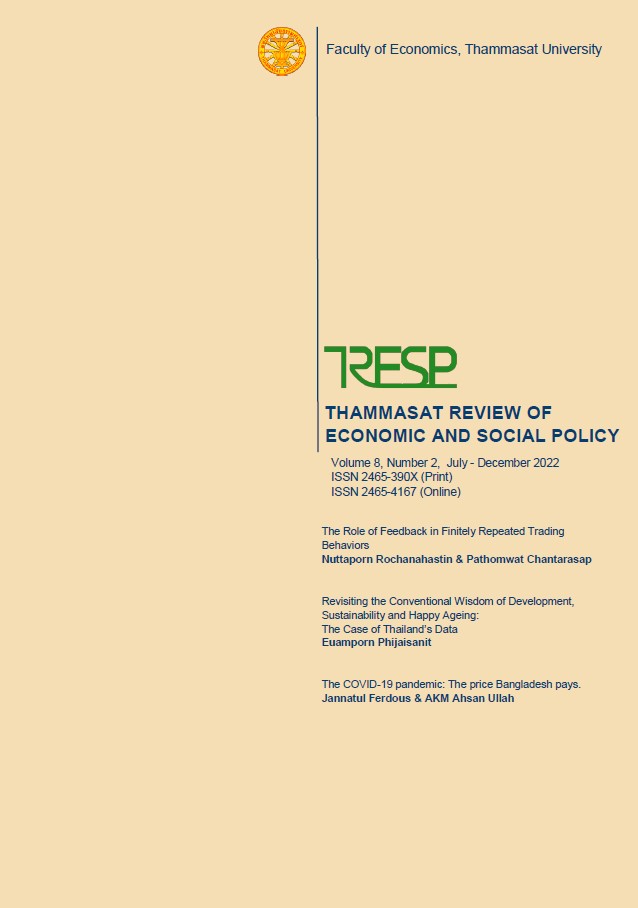The Role of Feedback in Finitely Repeated Trading Behaviours.
Keywords:
Reputation , Feedback Mechanism, Finitely Repeated Game, ExperimentsAbstract
This paper investigates the effect of feedback systems and exogeneous shock in the finitely repeated game. We ran three treatments in the experiments, namely, the stranger market (control), the feedback market and the partner market. In the stranger market, a buyer and a seller were rematched in every round. In ยthe feedback market, the setting was similar to that of the stranger market, except the buyers were provided with seller’s history. Buyers and sellers play with the same partner throughout the experiment in the partner market. The stranger and partner market enables us to observe the different between direct and indirect feedbacks. The results show that, first, feedbacks can increase cooperation. Second, direct and indirect feedbacks yield indifferent results. Trading efficiency and the number of buyer’s order are not statistically different between those two feedback sources. Lastly, we find that the exogeneous uncertainty does not have a strong effect on buyers’ decision.
References
Arrow, K. J. (1974). The limits of organization. WW Norton
& Company.
Bolton, G. E., Katok, E., & Ockenfels, A. (2004). How
effective are electronic reputation mechanisms? An
experimental investigation. Management science,
(11), 1587-1602.
Bolton, G. E., Katok, E., & Ockenfels, A. (2005). Cooperation
among strangers with limited information about
reputation. Journal of Public Economics, 89(8), 1457-
Choe, Y. C., Park, J., Chung, M., & Moon, J. (2009). Effect of
the food traceability system for building trust: Price
premium and buying behavior. Information Systems
Frontiers, 11(2), 167-179.
Dellarocas, C., & Wood, C. A. (2008). The sound of silence in
online feedback: Estimating trading risks in the presence
of reporting bias. Management science, 54(3), 460-476.
Electronic Transactions Development Agency (2018). ECommerce
survey report.
https://data.go.th/th/dataset/item_34a6eabd-9bb2-46f9-
a85a-9907de4bf0b3.
Ert, E., Fleischer, A., & Magen, N. (2016). Trust and
reputation in the sharing economy: The role of personal
photos in Airbnb. Tourism management, 55, 62-73.
Fischbacher, U. (2007). z-Tree: Zurich toolbox for ready-made
economic experiments. Experimental economics, 10(2),
-178.
Gefen, D., & Straub, D. W. (2004). Consumer trust in B2C e-
Commerce and the importance of social presence:
Thammasat Review of Economic and Social Policy
Volume 8, Number 2, July – December 2022
experiments in e-Products and e-Services. Omega,
(6), 407-424.
George, A. (1970). The market for lemons: Quality uncertainty
and the market mechanism.
Hawlitschek, F., Teubner, T., Adam, M. T. P., Borchers, N. S.,
Moehlmann, M., & Weinhardt, C. (2016). Trust in the
sharing economy: An experimental framework.
Hawlitschek, F., Notheisen, B., & Teubner, T. (2018). The
limits of trust-free systems: A literature review on
blockchain technology and trust in the sharing economy.
Electronic commerce research and applications, 29, 50-
Jin, G. Z., & Leslie, P. (2003). The effect of information on
product quality: Evidence from restaurant hygiene grade
cards. The Quarterly Journal of Economics, 118(2), 409-
Kim, J., Yoon, Y., & Zo, H. (2015). Why people participate in
the sharing economy: A social exchange perspective.
Kreps, D. M., Milgrom, P., Roberts, J., & Wilson, R. (1982).
Rational cooperation in the finitely repeated prisoners'
dilemma. Journal of Economic theory, 27(2), 245-252.
McMillan, J. (2003). Reinventing the bazaar: A natural history
of markets. WW Norton & Company.
Nosko, C., & Tadelis, S. (2015). The limits of reputation in
platform markets: An empirical analysis and field
experiment (No. w20830). National Bureau of Economic
Research.
Resnick, P., & Zeckhauser, R. (2002). Trust among strangers
in Internet transactions: Empirical analysis of eBay's
reputation system. In The Economics of the Internet and
Thammasat Review of Economic and Social Policy
Volume 8, Number 2, July - December 2022
1
E-commerce (pp. 127-157). Emerald Group Publishing
Limited.
Resnick, P., Zeckhauser, R., Swanson, J., & Lockwood, K.
(2006). The value of reputation on eBay: A controlled
experiment. Experimental economics, 9(2), 79-101.
Selten, R. (1990). Bounded rationality. Journal of Institutional
and Theoretical Economics (JITE)/Zeitschrift für die
gesamte Staatswissenschaft, 146(4), 649-658.
Tadelis, S. (2016). Reputation and feedback systems in online
platform markets. Annual Review of Economics, 8, 321-
Tadelis, S., & Zettelmeyer, F. (2015). Information disclosure
as a matching mechanism: Theory and evidence from a
field experiment. American Economic Review, 105(2),
-905.
U.S. Department of Justice (2002). Internet Fraud.
http://www.internetfraud.usdoj.gov/#What Are the
Major Types of Internet.
Weiers, R. M. (2010). Introduction to business statistics.
Cengage Learning.
Zagata, L., & Lostak, M. (2012). In goodness we trust. The
role of trust and institutions underpinning trust in the
organic food market. Sociologia Ruralis, 52(4), 470-487.
Downloads
Published
How to Cite
Issue
Section
License
Copyright (c) 2022 Thammasat Review of Economic and Social Policy

This work is licensed under a Creative Commons Attribution-NonCommercial-NoDerivatives 4.0 International License.



